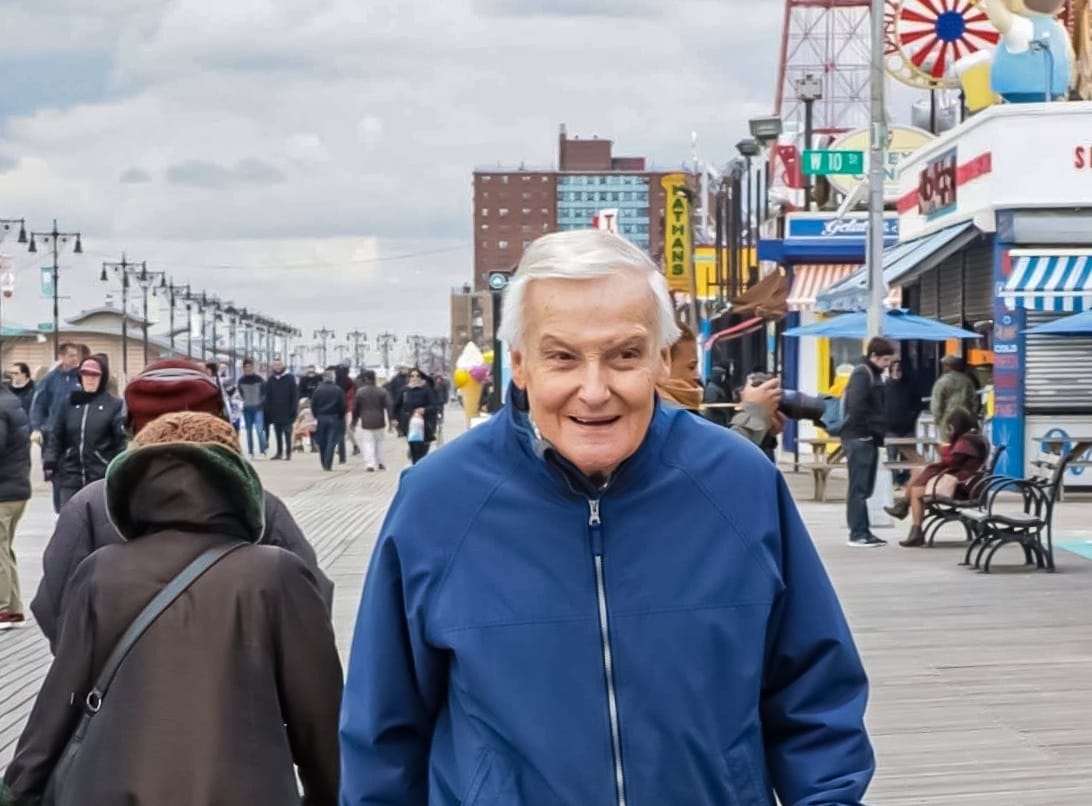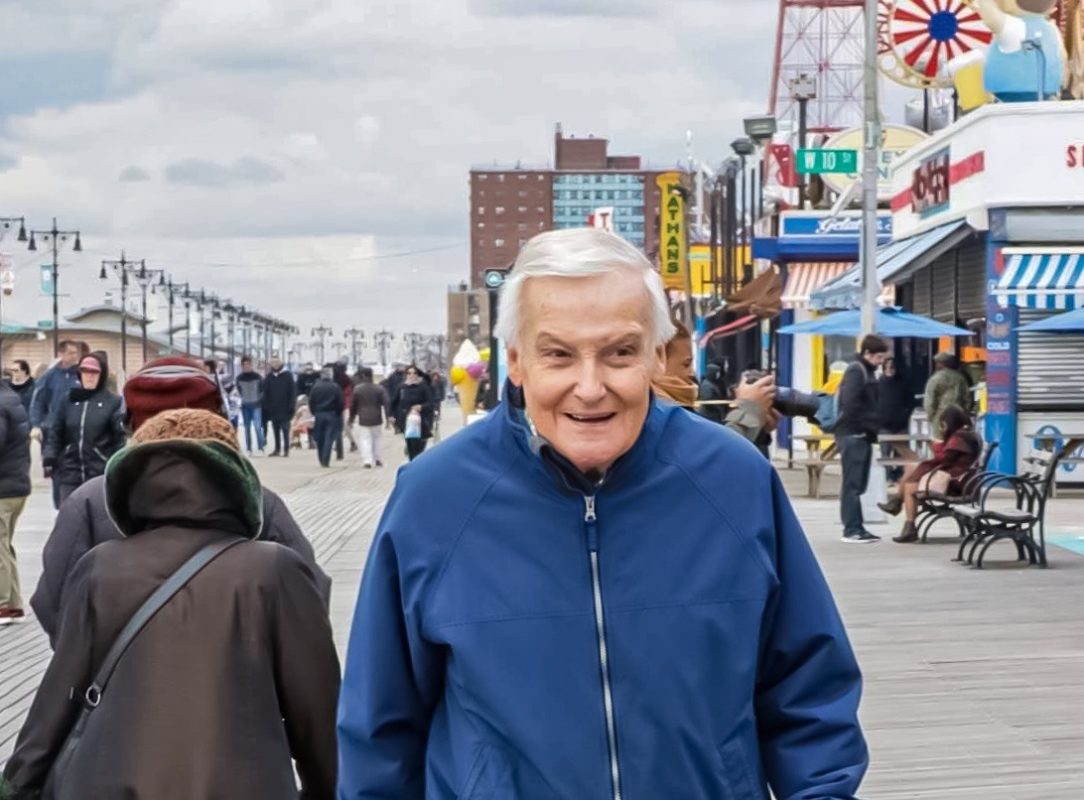Remembering The Prince Of Mermaid Avenue


Jimmy Prince, the beloved butcher of Mermaid Avenue, died on Monday, May 3, 2021, aged 89. He was, for sixty years, the butcher at Major Markets Prime Meats located at 1516 Mermaid Ave.
James Prince was born on April 22, 1932, in Flatbush, near Brooklyn College, and attended elementary school P.S. 207 in Marine Park, on the same block he would later live on for the last 40 years of his life.
Prince started at Major Markets Prime Meats as an 18-year old apprentice working for $35 a week in 1949. He took over the butcher business from William Palumbo, the previous owner, in the mid-1970s when there were six butcher shops on Mermaid Avenue. While others closed as Coney Island went through a process of urban renewal, Major Meats lasted the longest, closing on April 16th, 2009. Mermaid Prime Meats was founded after Major Meat’s closure by Prince and his business partner Sabino Eugenio. Eugenio apprenticed under Prince and runs the new shop at 1610 Mermaid Avenue.
Known for his handmade Murder Burger and chicken salad, Prince would work 12-hour days, seven days a week charming his customers, telling them stories, and creating a community gathering spot where people could chit-chat and discuss the news of the neighborhood.
“I’ll always remember he told me, ‘I might not be the richest man in the world moneywise, but I have my family and that makes me the richest man in the world’,” Michael Quinn, a local historian and the founder of Feltman’s Hot Dogs, recalled remembering Prince.
Prince was always proud of his family, supporting his children in whatever efforts they pursued, the family shared. Each child became professionally successful in their own right, pursuing different careers and becoming a professor, a mathematician, a neurologist, a lawyer, an IT specialist, a journalist, and a film editor.
His son Todd Prince told Bklyner, that starting from around 1980 when his Dad began working seven days a week, Prince would only take Christmas and Easter off and he would never get sick or seem tired. “All he needed at the end of the day was a hot bath and then he would be ready for work the next day,” said Todd.
Prince would go out of his way to customize his products for every customer, knowing what they wanted, how often they came to his shop and ensuring that goods were delivered when needed. A typical day in his store was captured by the Coney Island History Project back in June of 2007.
Never charging for delivery, Todd said his father would buy bread from the bakery next door and include it with orders to customers at no additional charge. He was also known for allowing long-term customers to buy goods on credit, which sometimes they were unable to pay back.
Prince was also known for his passionate dedication to his neighborhood. His storefront was covered in signs that not only advertised his products but contained positive messages about Coney Island.
“During the worst days of Coney Island, in the 1970s, when there was a lot of arson, violence and white flight, Jimmy was a ray of sunshine, presenting the community with a smile, optimism and he maintained high standards,” Dick Zigun, the president of Coney Island USA, a local non-profit group dedicated to the arts told Bklyner.
Zigun recalled that Prince was one of the earliest donors to the first Coney Island Mermaid Parade in 1983 when there were more people in the parade than watching it, and Zigun said he used Prince’s first $100 check as a talking point with other merchants to encourage them to donate to the parade. The Mermaid Parade became a smashing success in bringing people to Coney Island. In 2018, it attracted 870,000 people, the best attended year yet.
In 2009, when Coney Island went through a rezoning, Prince was active in Community Board 13 meetings, and Zigun said that “everyone wanted to know what Jimmy thought about the rezoning.” The community’s love for Prince crossed all racial and economic boundaries, according to Zigun.
Prince was also always in attendance when Zigun held cultural events from theater performances to the Coney Island Film Festival, attending the last one in September 2019, and it was clear when he stopped attending community events that it was only because his health was in decline – Prince had brain surgery in 2019.
The days leading up to the closing of Prince’s butcher shop in 2009 were the subject of two documentaries, “The Prince of Mermaid Avenue” by Charles Denson and “Majors, We Don’t Want to Say Goodbye 2009” by Lou Dembrow.
Georganna Deas, who worked for 13 years for Astella Development on Mermaid Avenue near Major Meats, remembers Prince’s generosity and philanthropy to the neighborhood. “On the 2nd floor of his building was a group home for the emotionally disturbed and Jimmy would quietly supply meats for his neighbors,” Deas recalled to Bklyner. After his retirement, Prince would work at his friend’s butcher shop, the G&S Pork store on Avenue U, where Deas would sometimes see him, she said.
Late in life Prince became a Facebook user at the suggestion of his son Todd, who wanted to help him keep in touch with his old Coney Island customers. Todd told Bklyner it was remarkable his Dad in his 80s became more active on Facebook than his kids. His FaceBook page is full of posts about donations he made to fundraisers started by others.
Councilman Mark Treyger paid tribute to Prince by calling his business an anchor to Mermaid Avenue. “He was a cheerleader for a neighborhood that he always believed in and fought for even beyond retirement,” Treyger wrote in a Facebook post, vowing that his office would announce efforts to further memorialize Prince in the future.
Jimmy Prince is survived by his wife, Barbara, seven children– Dawn, Adam, Darryl, Brent, Erik, Todd, Jaime, and 13 grandchildren.




